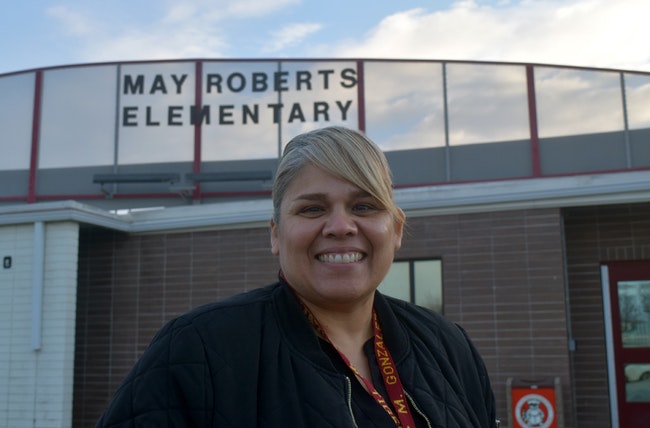
Melissa Gonzalez, a family coach for the Department of Human Services in Ontario, travels throughout county schools to help connect students and their families with resources. (The Enterprise/Yadira Lopez)
ONTARIO – It’s a chilly Wednesday morning and Melissa Gonzalez stands outside May Roberts Elementary School, hands in pockets, as she scans the line of cars dropping off students.
She’s looking for a specific family. A teacher at the school alerted her that one of her students was currently homeless, living out of a van.
Gonzalez, a family coach for the state Department of Human Services, knows how she may be able to help. So her eyes search for the vehicle matching the description she’s been given.
No luck on that particular day; she doesn’t find the vehicle. But next time she sees the family, she’ll try pressing a business card into the mother’s hand. She’ll introduce herself and ask the parent to give her a call.
Gonzalez said that because she works for the state’s child welfare agency, sometimes the reaction is defensive, or simply scared. There’s a stigma attached to the agency, she explained. But once parents realize she’s there to help, they soften up.
[ KEEP YOUR LOCAL NEWS STRONG – SUBSCRIBE ]
Gonzalez is one of four family coaches in Malheur County. Since 2017 she’s been working full time inside county schools. Gonzalez spends the week traveling between local elementary, middle and high schools.
“We were trying to meet with our clients out in the community in areas where they’re comfortable dealing with us and make it more convenient [for them] to get services,” said Dan Ramirez, self-sufficiency program manager at DHS.
Gonzalez said when she was first told she’d be working from the schools, she was confused.
“I thought to myself, don’t schools already have all the resources they need?” she remembered. But now, she says she is 10 times more effective than she used to be sitting at her office desk.
Her job is to bridge the gap between what teachers and staff at schools see daily and the resources that are available to help.
She’s often tasked with following up with families of students who are chronically absent.
“There’s always a deeply rooted reason,” said Gonzalez.
Sometimes mom is going through severe depression and an older sibling is in charge of getting the younger ones ready for school, she said. Some students live in crowded homes with only one bathroom. Others are living in cars.
She can approve state SNAP benefits for families on the spot. Or steer parents toward other community resources for housing or mental health services.
Her job often has her calling on community business partners. If she finds out a parent just lost a job, Gonzalez said she’ll go around to local businesses to see if there’s a vacancy. A student who is squinting in class and needs a new pair of eyeglasses but can’t afford them? Gonzalez checks with a local clinic to see if there are any surplus frames.
She’s built trust over time. One mom she helped out a few months ago reached out to her directly when she needed a hand. In the halls, a little girl recognized Gonzalez and waved shyly as she walked past her.
“We probably changed somebody’s life or way of thinking about what we do,” Ramirez said, adding that the agency is brainstorming other places where they can make their services more accessible.
Gonzalez had to build trust among teachers, too. They were skeptical of the agency’s presence at the school. But now, she said, they see her as an ally.
“We needed this position to get everybody connected,” Gonzalez said.
That same Wednesday, as she made the rounds greeting administrators, a school counselor and cafeteria employees who all know her by name, a teacher in the hallway tells her “I have to talk to you” and Gonzalez signals “call me” with her hands.
“Teachers get a lot of information about family circumstances, but we don’t necessarily know where to go,” said Sarah Poff, a music teacher at May Roberts.
Poff said before, it wasn’t rare for teachers to raise funds among themselves, dipping into their own pockets to help a student.
The stigma attached to DHS keeps some families from going to the department’s office for help, she added. Gonzalez can pick up documents from parents directly at the school and find out if they’re already getting services through the agency or could benefit from them.
Poff said she knew about some of the resources in place, but having Gonzalez around ensures that kids don’t get overlooked.
Although Ramirez said Gonzalez’s role has been effective, there are no immediate plans to place additional employees in schools. He said the agency currently lacks the staffing to do so.
Have a news tip? Reporter Yadira Lopez: [email protected] or 541-473-3377.
For the latest news, follow the Enterprise on Facebook and Twitter.
SUBSCRIBE TO HELP PRODUCE VITAL REPORTING — For $5 a month, you get breaking news alerts, emailed newsletters and around-the-clock access to our stories. We depend on subscribers to pay for in-depth, accurate news produced by a professional and highly trained staff. Help us grow and get better with your subscription. Sign up HERE.




